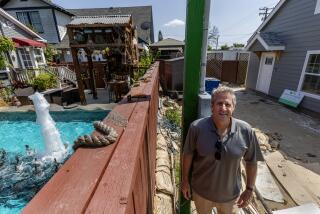Courts can help break board deadlock
- Share via
Question: I live in a deed-restricted two-on-a-lot detached condominium. We do not have a management company and our CC&Rs; are “standard.” There are only two members in our homeowner association, and we’re both on the board.
I’m the chief financial officer, and my neighbor is an officer. We have not agreed on one thing since we bought.
Last year, a house several blocks from our property blew up, damaging our homes and dozens of others. More than six months ago we both received generous insurance payments for restoration and repairs. But the other owner refuses to make the repairs.
The majority of the structural repairs are to the outside “common area” of her unit. Because of the damage, we have both been living in temporary housing for months.
The other owner refused to meet with me, so I hired an attorney on behalf of the association, but had to pay for it myself. I gave notice, called a special meeting and distributed the minutes. I was the only one who showed up so I had an executive session with myself. Following the law, I raised the association dues 20% and also implemented more rules and regulations with fines.
I’m the only one who pays the dues increase and all the notices of fines are ignored. I want a special assessment to complete repairs but can’t get enough votes or proxies for it. If I have the common area fixed and she refuses to pay the bill, then I have to sue at my own expense.
The annual meeting is next month. If the other owner doesn’t abide by the rules, there is no way to enforce them.
Can I sue the developer for inflicting emotional distress by subjecting me to deed restrictions and for building my home in a common interest development? Can I have the deed restrictions removed?
Answer: Creating a deed-restricted common interest development with an association on your property likely enabled the developer to realize a greater profit than had he built anything else. Unfortunately, suing the developer for emotional distress may be a waste of time and money and likely won’t help resolve your problems.
Review your covenants, conditions and restrictions (CC&Rs;). If they are due to expire, your deed restrictions will expire at the same time. Discuss with a real estate attorney the possibility of dividing the property, doing away with the CC&Rs; and lifting the cloud on your title immediately.
If owners cannot agree to meet and discuss alternatives, the Corporations Code provides another, albeit costly, alternative. In the event of a deadlock among directors, the Superior Court may appoint a provisional director who shall have all the powers of a director until the deadlock is broken or until removed by court order.
You may petition the court to appoint that provisional director, and the association will have to pay compensation. This will enable you to circumvent the deadlock and begin necessary repairs, enforce the CC&Rs; and get your “association” back on track. All these options are expensive, if not directly to you, then to the association, which is tantamount to the same thing.
If the court appoints a provisional director, you should have the votes to permit the association to hire a contractor to complete common area repairs without the other owner’s consent.
After the Northridge earthquake, owners whose units were destroyed and who could not persuade the other association members to vote to rebuild were forced to take the loss. If your neighbor walks and, as a result, stops paying association dues, the association can foreclose on the property.
In that case, either the association or you will be responsible for the ongoing mortgage payments until the unit is sold or foreclosed on by the bank. The association, as the titleholder, can then sell the property to you. It will then be easier to do away with the CC&Rs;, and no longer be deed-restricted. Another alternative is to sell both units to new owners, pocket the profits and move to a neighborhood without deed restrictions.
Stephen Glassman and Donie Vanitzian are the co-authors of “Villa Appalling! Destroying the Myth of Affordable Community Living” (Villa Appalling Publishing Inc., 2002). Please send questions to: P.O. Box 451278, Los Angeles, CA 90045 or e-mail your queries to: NoExit@mindspring.com.
More to Read
Inside the business of entertainment
The Wide Shot brings you news, analysis and insights on everything from streaming wars to production — and what it all means for the future.
You may occasionally receive promotional content from the Los Angeles Times.










